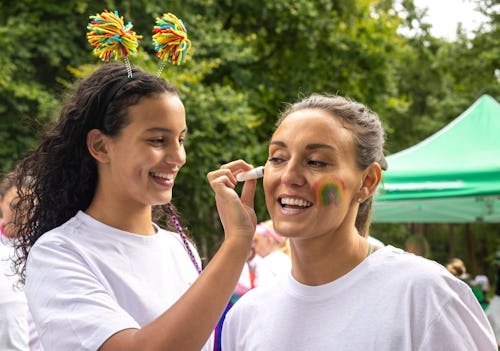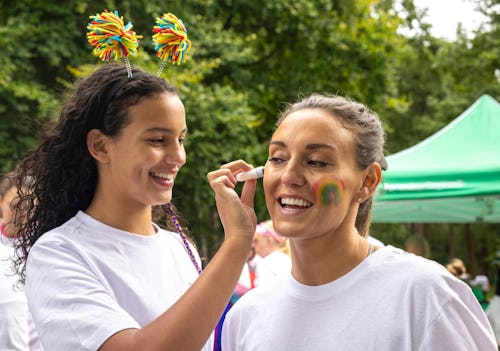

There are moments in parenthood that we often prep for. We know the first step is coming, so we steel ourselves with pride and try not to sob. During potty training, we read a million articles on what to do, so we’re already prepared for accidents. We know our kids will ask about sex or death. We know there will be power struggles and heart-to-hearts… sometimes all in the same day. But have you ever stopped to process what you might say if your child comes out?
Many of us idealize a day in which no one needs to “come out,” when wherever someone falls on the gender or sexuality spectrum is accepted and embraced. Sadly, today is not that day — the world can be cruel (and often is) to anyone who doesn’t fit into the heteronormative bubble. But if you’re here, it probably means the last thing you want to do is contribute to the mental and emotional toll put on LGBTQ young people.
So what can you say in the moment your child, teen, or adult child shares their truth with you? Many, many experts all landed on the exact same thing.
“Thank you for sharing this with me.”
Or some variation, like:
- “Thank you for sharing your truth.”
- “I’m so glad you’ve trusted me with this.”
- “I’m so happy you shared this with me.”
- “You’re safe with me.”
But one overarching theme remains: Be safe. Don’t “other.” Relish in the trust. Be ready, but not pushy, to chat more when they’re ready.
“Kids just wanna know that their parents love them in the grand scheme of things,” shares Ashley Brundage, CEO of Empowering Differences, a mom and trans woman. “My mom was a hot mess for two weeks when I came out to her. But after my sister told her that she was either going to have two daughters or no daughters, her decision to support me was very simple.”
Balance and Bloom Therapy’s Julia Malone, a therapist, mother of three, and member of the LGBTQ community, agrees with Brundage.
“When LGBTQ+ kids understand what their sexuality is and come out to their parent(s), their sense of safety and belonging in the world is deeply tied to how their parent(s) respond. Parents are their first attachment figures who are meant to provide support, protection, attunement, and love,” she shares. “When a parent replies with support and understanding, it provides a base for their children, which internalizes the belief of ‘I am safe, I am loved, and I belong.’ This belief can be a buffer for times in the outside world where there might be hate, bullying, homophobic comments, or rejection.”
What if you’re caught off guard? What if you’re not one of those parents who “always knew”? Malone shares that it’s incredibly important to power through and make the situation loving and accepting.
“If a parent responds with avoidance, dismissal, anger, shame, etc, a child may internalize a belief of ‘This part of me makes me ‘not good’ or unlovable,’” Malone says. “That kind of rupture, research shows, can lead to internalized homophobia, anxiety, depression, higher rates of self-harm and/or suicide.”
How to follow up after the initial conversation
“Another place parents get stuck is getting hung up on the specific label or assuming this is the final word on their identity. Identities evolve as we grow. Today’s language might shift tomorrow, and that’s not a sign of confusion or a phase — it’s a sign of healthy exploration,” says Rebecca Minor, an acclaimed gender specialist, educator, and author of the forthcoming Raising Trans Kids. “Instead of trying to pin things down, keep the door open with questions like, ‘Can you tell me more about what that word means to you?’ or ‘How can I support you right now?’ or ‘Is there anything you’d like me to learn more about?’”
Minor also wants parents to remember to follow up.
“The conversation doesn’t stop after that first moment,” reminds Minor. “The next talk might be about who it feels safe to tell, how to handle school, or what name or pronouns feel right. Your child may circle back many times as they sort through what feels true to them. What matters is that you keep showing up, over and over again, with the same message: I love all of you. I’m in this with you.”
Malone agrees, suggesting these conversation starters and opportunities for you both to grow together:
- Checking in about what we previously talked about, i.e., How are you feeling today?
- Asking about specific language your child wants you to use, such as how to address crushes, partners, or their pronouns.
- Look for opportunities to connect and show support, such as attending a pride event, watching shows that feature LGBTQ characters, reading books, or participating in other community events.
- Remind them there is space for further conversations about relationships, belonging, bullying, identity, and sex if age-appropriate.
How to handle an unaccepting parent or loved one
While Brundage’s mother came around quickly and accepted her daughter, not everyone in the family followed suit. “I never received any support from my father,” she shares. “So parents can take it two ways, but I can tell you that love and support will always win.”
Brundage shares a message of acceptance, even for people who aren’t accepting of her. “I think in our current society, it’s important to know that people have very differing degrees on so many issues, and that’s why finding common ground elements is so necessary,” she says. “In relation to differing opinions about gender-affirming care, I would recommend that parents involve medical professionals, counseling, groups, and therapy, because those were instrumental in me finding success.”
She goes on to explain that there’s important work to be done. Allies, especially, should take this on.
“When we disagree on an important topic like human rights, which is what gender-affirming care is, then we must work hard to educate the person who doesn’t understand. Treat it like a life or death situation of paramount importance,” says Brundage. “Give the other person factual data that you have researched because there is so much misinformation in the world on this topic. I think it’s also imperative that, as parents, you do your research, and if you do that, you will realize that everybody has access to gender-affirming care. Cisgender people use gender affirming care each and every day. Just a few examples are hair dye, Botox, fillers, breast augmentation, and even male enhancement pills.”
Finally, don’t lose sight of the fact that your first job as a parent is to love your kid the best you can. If their coming out knocks you off your feet with surprise, try to recover gracefully by using the suggestions above. Avoid relying on your kids (of any age) to help you process your own feelings. Instead, talk to a therapist or one very, very, trusted friend.
And remember: It’s not your news to share with anyone else.
Resources you may find helpful
- The Trevor Project
- WPATH
- Raising Trans Kids
- PFLAG
- GLSEN
- Human Rights Campaign
- Trans Lifeline
- Gender Spectrum
- Eshel (Specifically for LGBTQ Jews)


